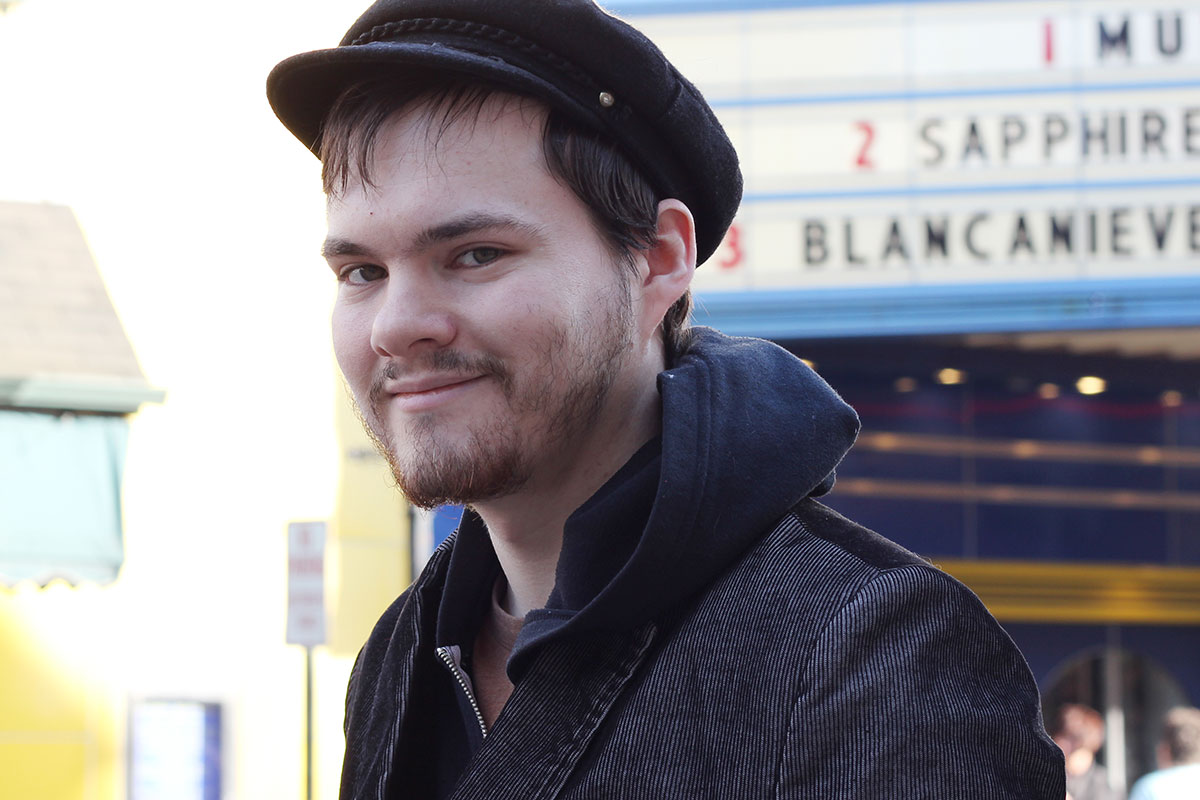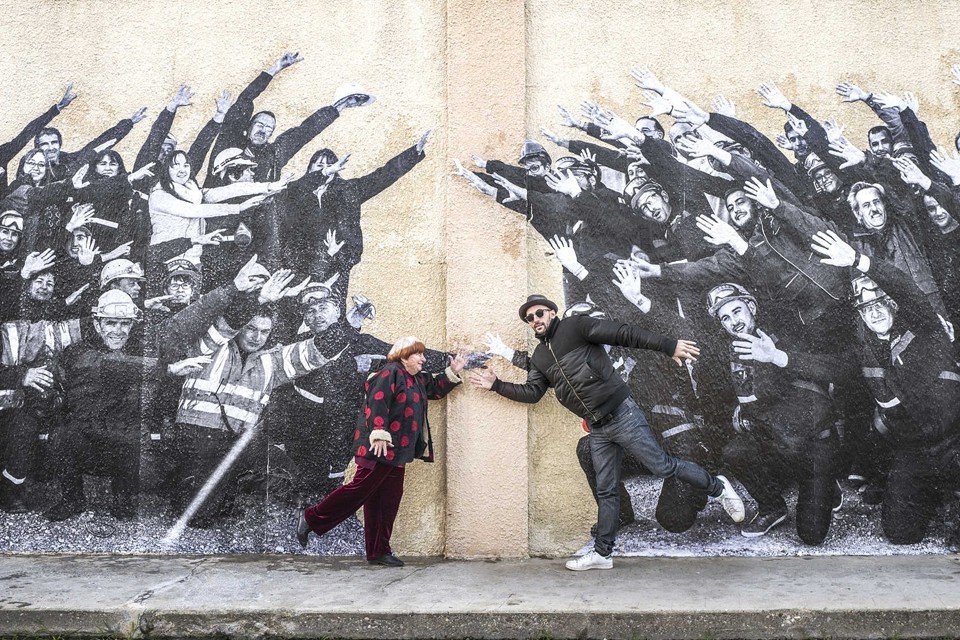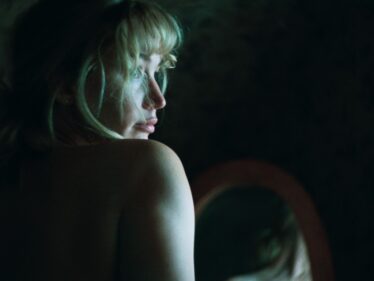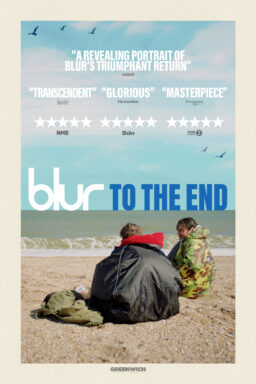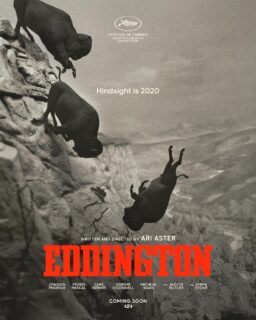The red carpets of any Cohen media building are a little overwhelming. They put you on alert, make the space seem bigger, but also like it might be closing in on you. The fifth floor office on 59th street is all sensory overload, phones ringing, hushed conversation, employees making use of the little kitchen, four TVs playing four different trailers at any given moment, people bustling every direction, men in suits disgorged from the four elevators at the end of the hall and gawking in through the glass door to the office as they pass. And in the middle of all this chaos sits Agnès Varda, a tiny vision of resistance, whose hair, a stripe of brick red over her eyes and ears and just beneath a snowy white top, makes her look like a mountain. Saying she’s like one is almost too easy—she’s stood strong for decades (centuries in the short history of film) and now, almost 90, she exists as a brilliant legend, warmth itself on screen and in our collective cinephile memory. She encouraged us to peer into her life in her films, most emphatically in her 2008 memoir “The Beaches of Agnès,” a rapturous look at what film can do for a life, as well as what it takes away.
She still remembers Roger Ebert’s review of “The Beaches of Agnès,” and with her memory beginning to fade, that means a lot. She met him in 1977 at the Cannes Film Festival, the year her husband, director Jacques Demy, served on the jury. She tells me she loved the care he took in his words to describe her film and indeed her whole artistic life. His praise is indeed effusive and heartbreaking. He writes ” … her greatest triumph is her life itself. [Her films] were made out of love of the art form, and constructed by what fell to hand and seemed good to her. And now at 80 she can walk backwards with more serenity than most of us, because she will not stumble.” At almost 90 she seems tired but there is yet light and mischief in her eyes as she smiles at me, sunk into a red chair in the lobby of that busy office.
She’s joined by the photographer JR, her co-director of what may end up being her last film, a subject on which she can’t seem to make up her mind. She says she might be done and laments financing. They filmed their project, the sublime experiment “Faces Places,” in week-long bursts over several months while Varda’s daughter Rosalie secured further financing. Distribution and promotion stresses her out now. She’d give the film up for free if she could. “The dream would be do it for free in the streets and in theatres, help people come, give them chairs, let them watch.” JR helps her whenever she needs something translated, and his affection for her is inspiring. He wants to share her with everyone. She’s tired and he knows it, so he leaps in when he can to relieve the burden of giving too much of herself during the talk. It’s been a long day of interviews.
“I just wanted to get him out of the city,” she says. JR so rarely leaves his studio. Like his sunglasses, the city seems to guard him. She pulled him out of his comfort zone, and he encouraged her to come out of retirement. “I thought when I did it, I was afraid to become 80. I had to do something to put a mark, and say “This is it. This is it.” I will have a film, I will finish it before I am 80. Then I will stop.”” I was not so pleased to film me, but I had to be in the film, facing backwards, and going back in my life as I wanted to show people the work I did, the films I made, the feminism … my work. I have to be there sometimes. It’s not that I wanted to do it. It was necessary.” And that it seemed, would be the end of her career behind the camera. But no one who builds a house of celluloid can stay away long.

“By chance we started [“Faces Places”] and it wasn’t a real project but it became one. I liked it very much because we enjoyed meeting these people. It became important to be free, to go from one place to another, shooting one week per month, not more than that. That would allow me to rest a little, find other places, and edit, find pieces missing. It took us two years. Meanwhile he was creating, I was doing exhibition. Even though we were building a real film, we built it peacefully while Rosalie was finding the money.”
The last few years of Varda’s creative life has been about reflection. Her work in the ’90s frequently found focus looking at the work and life of her late husband. “The Beaches of Agnès” tells her story through the images she’s collected throughout her life. And Visages Villages has a look back at the start of her career. After her feature debut, 1954’s “La Pointe Court,” Jean-Luc Godard recommended her to producers, who took her on and allowed her to make the transcendent Cleo from “5 to 7,” one of the finest films ever made. In that film there’s a lovely vignette where her lead sees a short, silent film starring Godard and Anna Karina. JR reminds Varda of Godard, so she tries to arrange a meeting in the film, which doesn’t go as planned.
“When I met JR with his glasses it reminded me that Godard had the same kind of glasses. And he took them off in that short film. It came to my mind naturally and became a side theme. Will he or won’t he take off the glasses. Godard took his glasses off for three minutes, then kept them forever. It’s in my mind, what I’ve done, that can be used for something.” She talks of disturbing the legend of Godard, as when she and JR recreate the famous sequence in the Louvre in “Bande à part,” which she undertakes in a wheelchair because she can no longer run. Her face erupts in a smile thinking of the memory. “I loved that.”
The interview is short, she’s tired and feels less and less like speaking English, but as she’s preparing to stand she has a thought, perhaps linked to the silent film she made with Godard. “JR … the next film … it should be silent. We should make a silent film.” How does your heart not leap seeing a woman who keeps threatening to retire unable to stop finding inspiration? Film keeps her alive and keeps sending frissons through her spirit that reverberate throughout the history of cinema. We’re lucky to have Varda, whose images have always been joy inked in light. Maybe this film will be her last, but the look in her eye just before I leave, stopping to gently shake her tiny hand, the hand that touched a million cameras, cradled children, that held Jacques Demy as he passed, says we ain’t seen nothing yet.
